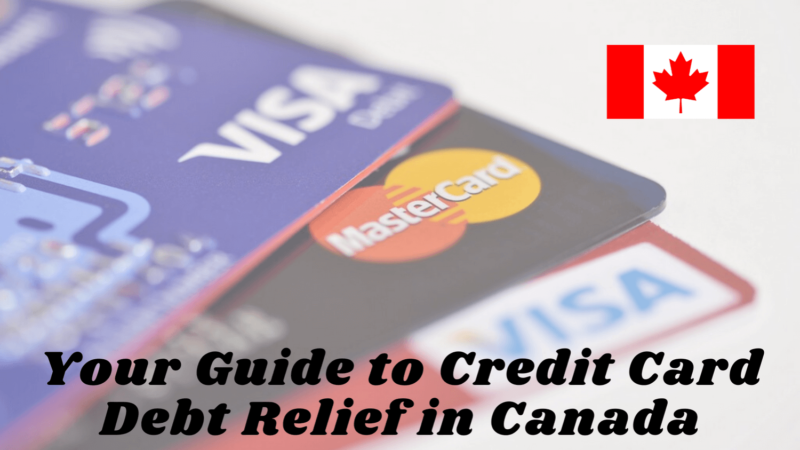No products in the cart.
Your Guide to Credit Card Debt Relief in Canada

A lot of people get discouraged from applying for credit cards due to the possibility of accruing debt. After all, not being able to pay credit card bills on time can take a massive toll on your credit score, and it might take you years to get your numbers back on track.
However, remember that just because credit card debt can be a headache to repay doesn’t mean it’s impossible. You really only lose if you give up. Better financial habits combined with the right strategy can make it easier for you to climb out of debt.
If you live in Canada, here’s your guide to credit card debt relief:
Overview
Approximately 60% of Canadians don’t completely pay off their credit card debt each month. Unfortunately, unpaid credit card debt can add a lot of financial burden to people who already have other financial obligations, such as personal loans and mortgages. Without proper assistance and guidance, people may end up burying themselves in debt, resulting in low morale, anxiety, unhappiness, and drastically lower credit scores.
For situations like this, debt relief institutions come in handy. They provide consumers with various options they can take to get out of debt. In this article, we’ll give you a quick overview of your credit card debt relief options, as well as useful tips to help you manage your debt.
Your Options
Accumulating a bunch of outstanding debts sucks big time, but it’s not the end of the world. Here are some debt relief options that can help you with your credit card situation:
Repayment plans
Non-profit credit counseling agencies offer repayment plans with your chosen credit agency. The catch is that you have to pay your debts in full on top of the credit counseling agency’s fee, which is around 15% per month. In return, you’ll either get a lower overall interest or, in rare cases, none at all.
To see if this plan fits you, divide your credit card debt by 60, which is the maximum number of months you can repay your debt. It may be the right choice for you if you can afford the monthly payment.
Debt Consolidation Loans
Debt consolidation combines different debts into a single loan that you have to make repayments for. This option is ideal if you find it challenging to keep track of all your credit cards and other debts. Before applying for a debt consolidation loan, you must consider the following:
- See if you can qualify for a lower interest loan. Ideally, it should be smaller than what you’re already paying today, regardless of whether it is secured or unsecured. Rate Genie has useful info on Canada’s best rates. It would be best to check this resource before you apply for a debt consolidation loan.
- The loan should cover all of your outstanding debts. The goal here is to clear all of your debts, not just one or two of them. Paying for only one out of many debts will only cost you in the long run.
File a Consumer Proposal
In this option, you’ll have to coordinate with a licensed insolvency trustee to lay out a proposal for your creditors. The Trustee’s role is to contact the creditors and present the plan. The creditors will be the ones to decide whether to accept it. This proposal includes repayment of a portion of your outstanding unsecured debt, which you can repay for up to five years. Other conditions are possible and will be based on what you can afford.
File for Bankruptcy
Bankruptcy should always be your last resort. However, this may be the best option if you’re already receiving threats from your creditor’s collecting agency.
This option should eliminate your debts after completing your responsibilities, such as surrendering all your non-exempt assets to a licensed insolvency trustee. The trustee will liquidate all these assets and distribute them to your creditors. After this process, you should be discharged and should no longer be responsible for the debts included in the bankruptcy.
Tips
If you find yourself having to resort to any of the credit card relief options above, this doesn’t necessarily mean you’re irresponsible with your finances. However, getting into any form of credit card trouble should definitely serve as a wakeup call for you to improve the way you handle your money.
Aside from making your repayments, you can start better habits that can help you repay your debts faster and pave the way to financial stability. To prevent being drowned in debt, here are some tips:
Only use one credit card if possible.
Tracking several credit cards might cause confusion and stress. Trying to keep track of different balances, interest rates, terms, and due dates is certainly a task you can do away with. If possible, try only to have one or two credit cards at most.
Set your priorities straight.
If you already have several credit card debts and are struggling to pay them, try to prioritize and categorize them into two:
- High interest rates. Credit cards with high interest rates should be paid first as these balances might pile up and rack sky-high interests and penalties. Neglecting credit cards with higher interest rates will definitely cost you more in the long run, making it harder for you to pay all of it.
- Smallest balance first. Paying credit card debts with high balances can be overwhelming, so it’s better to repay debts with small balances first. Paying off your smallest balances also tends to be more attainable than going for your higher balances on the get-go.
Seek credit improvement help.
If you’re getting stressed out about your outstanding debts, you should consider seeking credit improvement help. Experts can help you plan the best strategy for repaying your debts and educate you on better ways to handle your finances. On top of that, they can also help you learn how you can efficiently increase your credit score, which is a huge plus.
Credit Card Relief: It’s Possible with Patience, Discipline, and Planning
Having credit card debt isn’t the end of the world, and it’s possible to eliminate this financial burden despite how scary the numbers may seem. Always remember that completely repaying off your credit card debt takes time and patience, as doing this will definitely take a toll on your current savings and spending. However, successfully clearing your debt will open a lot of opportunities for you in the long run. Good luck!










Leave a Reply